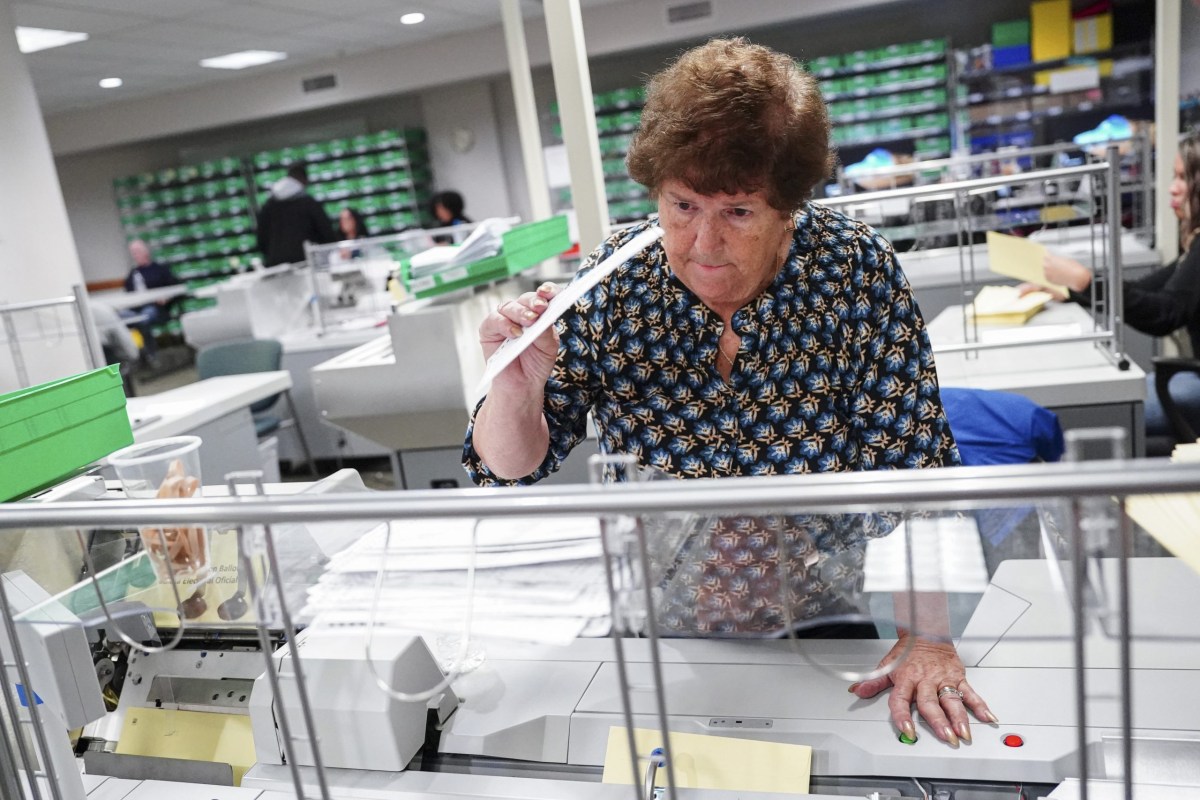
Spotlight PA is an independent, nonpartisan, and nonprofit newsroom producing investigative and public-service journalism that holds power to account and drives positive change in Pennsylvania. Sign up for our free newsletters.
HARRISBURG — As the 2024 presidential election approaches, the people who run voting in Pennsylvania say the commonwealth must prepare to be at the center of national scrutiny.
These officials, who administer elections on the county level, argue the state should update its century-old Election Code, make long-sought adjustments to mail voting processes, and strengthen the system against bogus fraud claims.
Former President Donald Trump propagated baseless theories about widespread election fraud in Pennsylvania and other key swing states after his 2020 loss, efforts that resulted in a large number of lawsuits in the commonwealth and subjected election workers to intense scrutiny and harassment.
In conversations with Spotlight PA, four election directors said there are a few concrete changes that would shore up Pennsylvania’s system against frivolous fraud allegations as the 2024 election — which could again feature Trump as a candidate — approaches.
Most of them are measures that election officials have pushed for consistently since 2020, but which polarized state lawmakers have not delivered. They include clarifying the state’s mail voting rules, allowing poll workers to count ballots before Election Day, and raising the bar for challenging results.
Administrative changes
Many of the policy changes that election directors want center around giving poll workers more time to do their jobs. Namely, they say the deadline for requesting a mail ballot should be earlier and that poll workers should be allowed to start counting mail ballots before 7 a.m. on Election Day, a process commonly known as pre-canvassing.
Currently, Pennsylvania voters can request a mail ballot up to a week before Election Day, which officials said leaves too little time to get ballots back to voters in time.
“Seven days is not very much time to receive an application, process the application, print and mail the mail ballots, for the voter to receive that ballot, to vote, and return it,” said Seth Bluestein, a Philadelphia commissioner who is one of three people charged with overseeing the city’s elections.
Election workers also don’t have much time to open and process mail ballots at the moment.
On a frigid and fiery night one year ago, a train upended lives in East Palestine
Since 2020, the first major election in which Pennsylvania used no-excuse mail voting, election workers have said the current rules make it very difficult to quickly release unofficial results. Pennsylvania’s slow pace in releasing vote counts during that election was a major factor in Trump’s ability to foment conspiracy theories about fraud.
Since then, pre-canvassing has been used as a bargaining chip during election law debates in the state Capitol. A 2021 omnibus bill passed by the Republican-led state legislature offered former Democratic Gov. Tom Wolf pre-canvassing in return for expanded voter ID requirements — a GOP priority. Wolf vetoed the bill because of that provision.
For election directors, pre-canvassing is more practical than political.
“We’re already working 14- to 16-hour days,” said Tonia Fernandez, who has served for four years as Erie County’s election director. “We’re constantly putting out fires, dealing with issues, and overseeing the process of canvassing.”
Fernadez says pre-canvassing would spread out the work that election workers have to do and create a more manageable schedule.
Ballot counting has gotten easier since 2020, partly because county workers now have more experience under their belts and because the state has allocated money for hiring more poll workers and purchasing equipment.
There is a catch: Counties that accept grant money from the state for elections must process and count their mail ballots without stopping until finished.
Erie County received over $900,000 in state funding from Act 88, and Fernandez said she’s not sure how the counting provision will affect her process in the upcoming presidential election. She already oversaw a midterm that featured nonstop counting, but 2024 will be even bigger.
“Before the election integrity grants were offered we would spend two or three days pre-canvassing and canvassing,” Fernandez said, noting that this approach gave “everyone the chance to sleep.”
Updating the code
Forrest Lehman, an election director in Lycoming County, said his priorities have shifted since the 2020 election.
“If you had asked me this a few years ago, I think my list would have largely aligned with other directors,” Lehman said, referring to expanded pre-canvassing and other measures designed to give workers more time to process ballots.
But now, he’s more concerned with strengthening the system against misinformation.
“It’s not pre-canvassing anymore, it’s not tinkering around with deadlines or even with mail ballot requirements,” he said. “It’s protecting our post-election processes and our certification processes from people who want to prevent democracy from functioning.”
In the aftermath of the 2020 election, Lehman said he saw requests for recounts that he felt were based on “dubious” evidence and that were resulting in expensive litigation.
Lehman wants the state legislature to update the cost to file recount petitions to account for inflation. The state Election Code set the price at $50 in 1937, which is equivalent to over $1,000 in 2023. Both Lehman and Fernandez, the Erie County election official, said that amount would better reflect the cost to counties when they have to administer recounts.
Lehman also argued there should be a penalty for counties that fail to certify elections. Currently, the main recourse the state has against a county that holds up certification is a lawsuit. Lehman pointed to the federal Electoral Count Reform Act as a possible model; the bipartisan federal law raised the threshold for Congress to object to a slate of electors during presidential elections.
Lehman also suggested criminal penalties for anyone who harasses or tries to intimidate county election officials and poll workers, and he said he supports creating a process whereby counties could defend themselves in court if recount petitions were filed.
“I think all of us have a suspicion that [2020]’s all just a dress rehearsal for next year,” said Lehman. “And the expectation is that it’s all going to happen next year if we’re not prepared.”
Some election directors also say holistic updates to Pennsylvania’s Election Code would create a well-oiled election process and head off false claims of fraud.
Facing tyranny, I tried to stay and fight with my pen, but had to flee for my life to Pittsburgh
The code is outdated. The bulk of its language was written more than 80 years ago, and some of its provisions are even older.
Because of this, counties’ actual administration practices sometimes must diverge from what is written in state law. Election directors rely on guidance from the state and their county legal counsel to navigate these gray areas in the law, but the situation can lead to misunderstandings and lawsuits from people confused about the law. It also leaves the door open for bad faith efforts to sow mistrust.
Thad Hall, election director in Mercer County, said one area that he thinks is particularly ripe for an update is language about technology, which is broadly inapplicable in the 21st century.
“The whole problem with the code is it’s written for paper, but we have an electronic process,” Hall said.
For example, the state Election Code currently requires each polling district to have two different workers keep lists of the voters who check-in. But Hall said that would not be necessary when using electronic pollbooks, which would record voters as they checked in.
“It makes it easier for everybody,” Hall said. “Right now, I have to have two people go around and their whole job all day is just to write [voters’] names in a book. A lot easier if the system gave us leeway as to how we handle these check-ins.”
Hall added that electronic pollbooks also streamline communication between precincts and election directors, as they provide up-to-date information on the number of votes cast in each precinct, allowing him to instantly check if the right number of ballots is being uploaded for every precinct. If he saw a pollbook was offline, he would know there was an issue in that precinct.
The chance for change
All of the election directors who spoke with Spotlight PA questioned whether the state legislature would be able to pass any of the changes they’re asking for.
Fernandez was the most optimistic, saying she hopes that after the 2022 general election, Republicans would begin to support mail ballots and find areas of compromise with Democrats in the state legislature.
To some extent, her hopes came true — GOP rhetoric against mail voting has shifted slightly. That change could be seen shortly after state Sen. Doug Mastriano (R., Franklin), who badly lost his gubernatorial bid to Democratic Gov. Josh Shapiro, said in a post-concession radio interview that he didn’t see how Republicans could win elections without “embracing” mail voting.
But that change in attitude hasn’t translated to legislative progress on election issues.
As recently as October, the state legislature has been unable to pass an election reform bill. As part of an effort to move the date of the upcoming primary so it would not conflict with Passover, state House leaders tried to pass a proposal that also rolled in pre-canvassing along with a more contentious provision that would expand voter ID requirements. The bill overwhelmingly failed to pass the state House.
“They just literally can’t pass a bill that is nondescript, it’s like it’s not in their DNA. And I do not understand why,” Hall said of lawmakers repeatedly adding politically divisive elements to bills that could otherwise get bipartisan support. “Is there any political advantage to passing the bill? Absolutely not. Will it make elections work better? Absolutely, yes.”
Both Lehman and Bluestein echoed Hall’s sentiments, saying they doubt any election law would change in time for next year’s races.
“The state-level actors, the courts, the legislature will have no one to blame but themselves. We’ve been very clear about what we need. They all refused to provide it,” said Lehman. “The can just keeps getting kicked down the road. And as long as that keeps being the case, the counties are going to have to be the adults in the room.”
BEFORE YOU GO… If you learned something from this article, pay it forward and contribute to Spotlight PA at spotlightpa.org/donate. Spotlight PA is funded by foundations and readers like you who are committed to accountability journalism that gets results.








